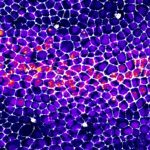Lien vers Pubmed [PMID] – 41072408
Lien DOI – 10.1016/j.cub.2025.09.040
Curr Biol 2025 Oct; ():
Tissue plasticity and homeostasis rely on the interplay between cell behavior and mechanical inputs.1 Mechanical stress also contributes to the evolution of pathologies, notably by accelerating pretumoral cell expansion through mechanical cell competition (MCC).2,3,4,5 MCC is a conserved process in which one cell population is preferentially eliminated when mixed with another cell population due to its higher sensitivity to mechanical stress.2,3,5,6,7,8 Theoretical and experimental explorations of MCC have mostly focused on the contribution of growth and pressure to cell elimination and a few genetic contexts, including the activation of Ras in vivo2,8 and mutation of the polarity gene scribble in mammalian cell culture.3,4,9 However, it remains unclear whether other oncogenes can trigger MCC and whether growth is generally the only central regulator of MCC. Using the Drosophila pupal notum (a single-layer epithelium), quantitative live imaging, and vertex modeling, we revisited the mechanisms contributing to MCC. Doing so, we outlined the co-existence of two modes of wild-type (WT) cell compaction near oncogenic cells, namely compaction driven by growth versus local compaction driven by increased tension at tumoral/WT cell interfaces in zones of high 2D curvature. We highlighted distinct signatures in cell deformation and cell elimination distribution that can delineate these two modes of compaction, and we recapitulated them in silico and in vivo using genetic backgrounds affecting growth and/or interfacial tension independently. Altogether, this study reveals the contribution of interfacial-tension-driven compaction to MCC and outlines the co-existence of various modes of compaction during MCC.




